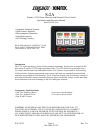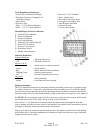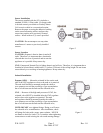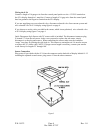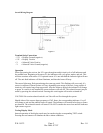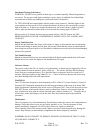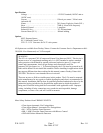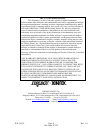P/N: 18122 Page 6 Rev. 1.0
Rev Date: 9/7/07
Functional Testing of the Sensor
WARNING: DO NOT use a gasoline soaked rag or a container partially filled with gasoline to
test sensor. The raw gas could ignite resulting in serious injury. In addition, the isolated high
concentration of fumes may damage the sensor and render it inoperative.
To TEST SENSOR use butane lighter with the striker wheel removed. Hold the lighter to the
sensor and press down on the lever to release the Butane. In three to four seconds the warning
light will come on. In about ten seconds the alarm horn will sound. Remove lighter from the
sensor. Mute the alarm horn and within several seconds the warning light will shut off.
Whenever the S-2A alarms, the horn may be muted with the “MUTE” button, but THE
PROBLEM SHOULD NOT BE CONSIDERED CLEARED UNTIL THE ALARM LIGHT
GOES OUT
Sensor Fault Detection
Should the unit determine that either of the sensors is faulty or disconnected, the corresponding
indicator will change to amber and the horn will sound, Check that the sensor is connected and
that wiring has not been frayed or cut. Should this condition persist, the sensor has been damaged
and must be replaced.
Unit Fault Detection
Should an internal failure occur, the unit fault light will display amber and the horn will sound.
Should this occur, return the display to the manufacturer for repair.
Nuisance Alarms
The sensor used for the S-2A is sensitive to hydrocarbons- an alarm may be triggered by the use
of other chemicals such as cleaners, paint, polish, etc… The sensors will also detect hydrogen
fumes from an overcharged battery. If no gasoline fumes are present, check for recent use of
cleaners, fiberglass repairs, strong adhesives, etc… If none of these are present, the sensor may
have been damaged and will need replacement.
WARNING:
The S-2A has been designed to alarm nominally at 20% of the LEL (Lower Explosive Limit) of
Propane/CNG. Implement immediately the following procedures in the event of an alarm. Shut
down all appliances. Manually shut oft the source of Propane/CNG. Turn off all electrical circuits
EXCEPT circuits, which operate blowers and/or exhaust fans. Remove all personnel from the
area. Ventilate the area; turn on exhaust fans and open windows, hatches, etc… Carefully check
all fuel lines, tanks and fittings to locate the leak. Have the problem repaired by qualified
personnel.
Maintenance
The S-2A requires very little maintenance. Periodically examine the sensors for contamination or
damage. Check that sensor wires are not frayed, pinched, or cut. Test the operation of both
sensors and display frequently. Do NOT expose sensors to liquids or chemicals.
When cleaning, seal off the sensor(s) with a plastic covering. Harsh chemicals may damage the
sensor. Keep sensor(s) sealed until the compartment has been completely ventilated.
CAUTION: DO NOT FORGET TO REMOVE SENSOR COVERINGS OR THE S-2A WILL
NOT OPERATE CORRECTLY.



